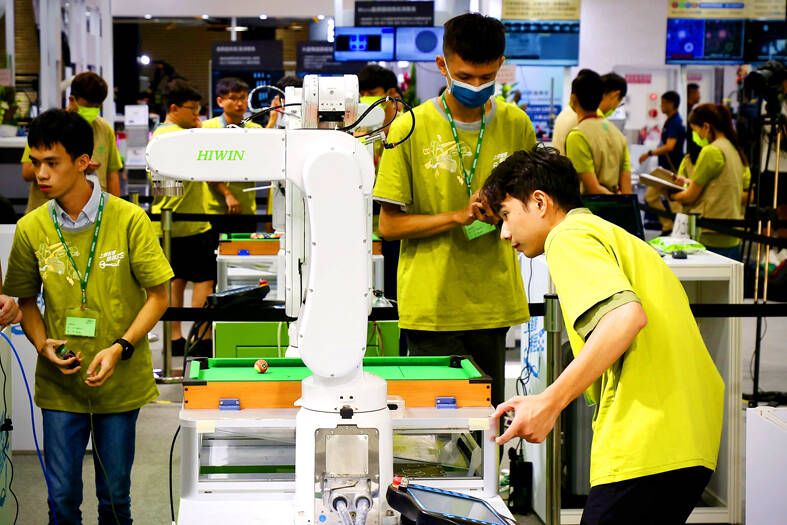The business climate monitor for the manufacturing industry in July turned “yellow-blue,” ending four months of recessionary state, as local firms benefited from the arrival of the high sale season for technology products, the Taiwan Institute of Economic Research (TIER, 台灣經濟研究院) said yesterday.
The institute’s business composite index picked up 1.16 points to 11.13, as the readings on demand and operating conditions gained value, TIER said, adding that input and cost measures shed further points, while selling prices held steady.
“Tech firms spotted a rebound in new business orders but non-tech product makers remain weighed by poor market demand,” the institute said in a report.

Photo: EPA
“The debt problems plaguing China’s developers and asset management companies add uncertainty to the market’s recovery,” it said, as nearly 40 percent of Taiwan exports head to China.
TIER uses a five-color spectrum to capture the industry’s health, with “red” indicating a boom, “green” suggesting steady growth and “blue” signifying a downturn. Dual colors indicate a transition to a better or worse state.
Taiwan houses the world’s major suppliers of electronics used in smartphones and artificial intelligence (AI) applications.
Firms in a transition state climbed to 34.38 percent, from 25.61 percent one month earlier, the institute observed. Firms trapped in business downturn eased from 66.58 percent to 45.68 percent.
A total of 17.72 percent reported steady growth and a slight 0.22 percent moved toward a boom, the institute said.
The improvement is evident among manufacturers of electronic components, thanks to a strong demand for AI devices and the upcoming release of new iPhone series, it said.
Operating conditions picked up for electrical and machinery equipment makers, lifting their business monitor to the zone of steady growth, but vendors of metal products floundered in the contraction territory. Upstream clients cut capacity to cope with tepid demand, it said.
Auto part makers benefitted from strong car sales in July when the number of new car plates grew 10.9 percent year-on-year to 42,400, the institute said.
However, input and demand lost steam after new car orders showed signs of retreat in the US and European markets, it said.
Makers of petrochemical, plastic and chemical products continued to struggle, as their orders, industrial output and selling prices have not yet stabilized, it said.

With an approval rating of just two percent, Peruvian President Dina Boluarte might be the world’s most unpopular leader, according to pollsters. Protests greeted her rise to power 29 months ago, and have marked her entire term — joined by assorted scandals, investigations, controversies and a surge in gang violence. The 63-year-old is the target of a dozen probes, including for her alleged failure to declare gifts of luxury jewels and watches, a scandal inevitably dubbed “Rolexgate.” She is also under the microscope for a two-week undeclared absence for nose surgery — which she insists was medical, not cosmetic — and is

GROWING CONCERN: Some senior Trump administration officials opposed the UAE expansion over fears that another TSMC project could jeopardize its US investment Taiwan Semiconductor Manufacturing Co (TSMC, 台積電) is evaluating building an advanced production facility in the United Arab Emirates (UAE) and has discussed the possibility with officials in US President Donald Trump’s administration, people familiar with the matter said, in a potentially major bet on the Middle East that would only come to fruition with Washington’s approval. The company has had multiple meetings in the past few months with US Special Envoy to the Middle East Steve Witkoff and officials from MGX, an influential investment vehicle overseen by the UAE president’s brother, the people said. The conversations are a continuation of talks that

CAUTIOUS RECOVERY: While the manufacturing sector returned to growth amid the US-China trade truce, firms remain wary as uncertainty clouds the outlook, the CIER said The local manufacturing sector returned to expansion last month, as the official purchasing managers’ index (PMI) rose 2.1 points to 51.0, driven by a temporary easing in US-China trade tensions, the Chung-Hua Institution for Economic Research (CIER, 中華經濟研究院) said yesterday. The PMI gauges the health of the manufacturing industry, with readings above 50 indicating expansion and those below 50 signaling contraction. “Firms are not as pessimistic as they were in April, but they remain far from optimistic,” CIER president Lien Hsien-ming (連賢明) said at a news conference. The full impact of US tariff decisions is unlikely to become clear until later this month

Nintendo Co hopes to match the runaway success of the Switch when its leveled-up new console hits shelves on Thursday, with strong early sales expected despite the gadget’s high price. Featuring a bigger screen and more processing power, the Switch 2 is an upgrade to its predecessor, which has sold 152 million units since launching in 2017 — making it the third-best-selling video game console of all time. However, despite buzz among fans and robust demand for pre-orders, headwinds for Nintendo include uncertainty over US trade tariffs and whether enough people are willing to shell out. The Switch 2 “is priced relatively high”